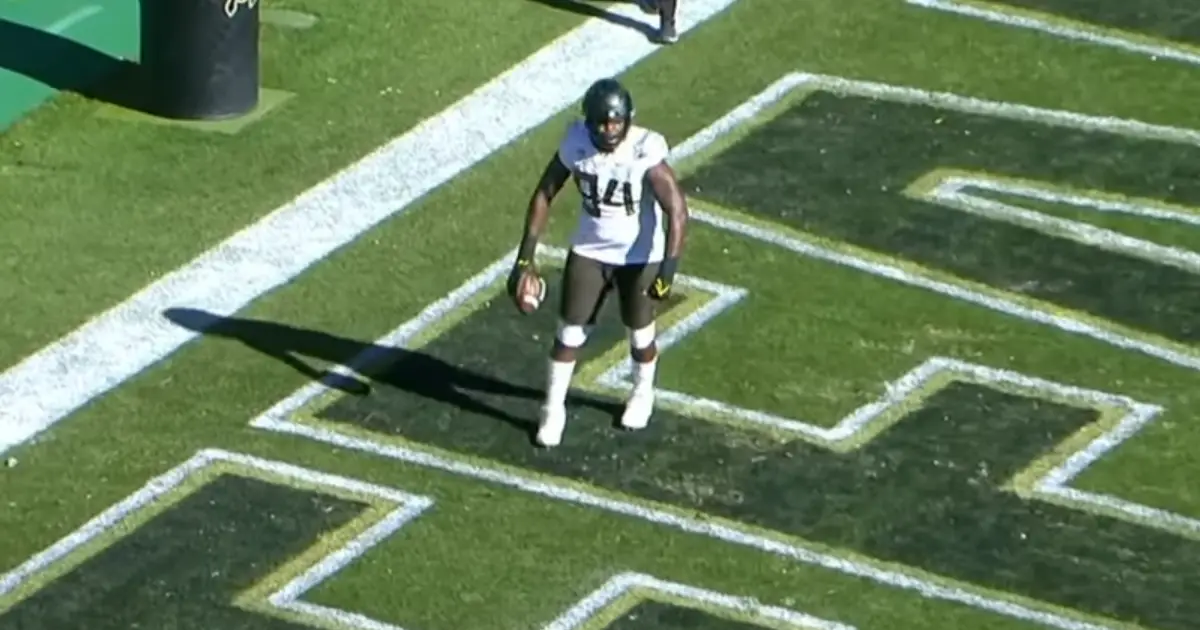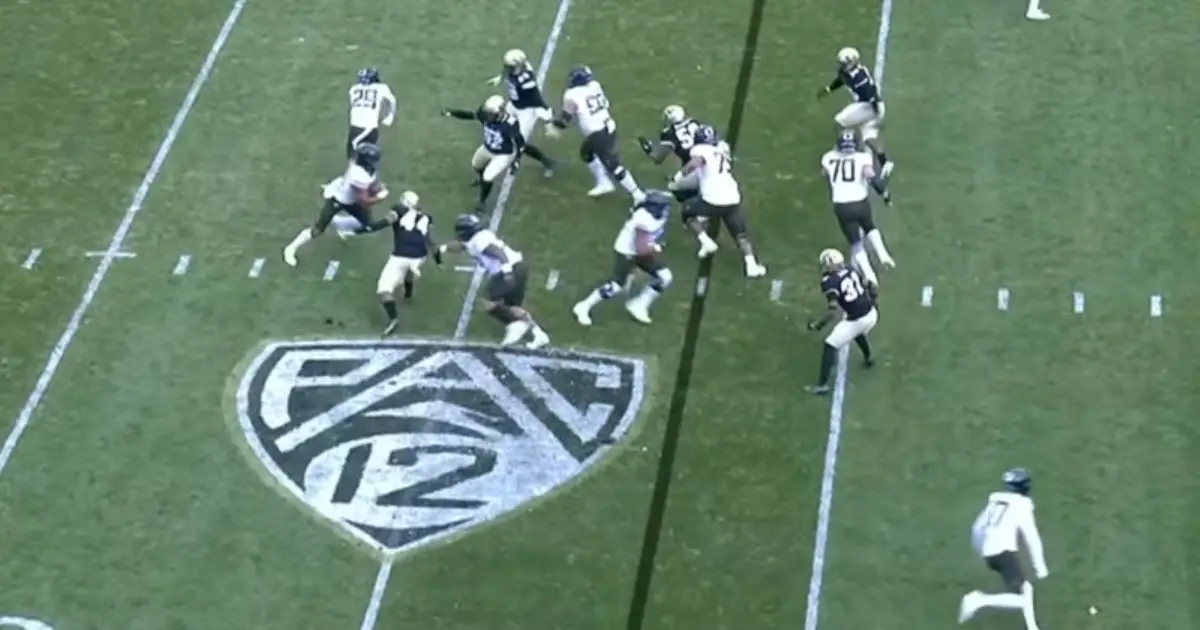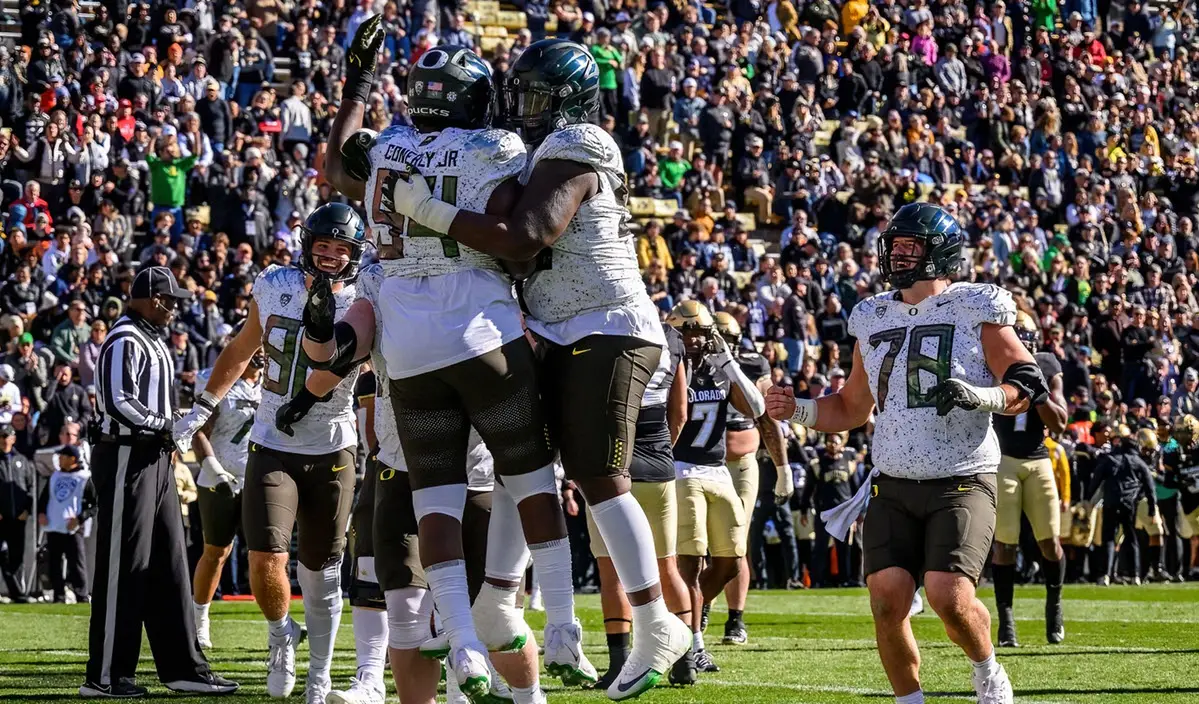Some of Oregon’s back-ups got a chance to see the field against Colorado this last Saturday, and offensively, they didn’t look good. Past wisdom says that even though those reps weren’t pretty, they did get the chance to see the field and run through some plays, which could be valuable experience next year. But like so many things concerning college football these days, past wisdom no longer holds true in the current environment.
The fact of the matter is, in today’s game if you’re good enough to see the field you’re going to play. There is a reason why Oregon has a personnel group called 14-J; the “J” stands for Josh Connerly, a former five-star offensive lineman. He isn’t good enough to unseat any of Oregon’s offensive line starters outright but he is good enough to see the field, and Oregon’s staff created a formation to ensure that he played.
In fact, all but two true freshman have appeared in a game to date. Some are seeing meaningful minutes, while others are only seeing the field during the final minutes of a blowout victory. Some freshman will red-shirt, and that is just fine developmentally. For many, a critical part of their development is bulking up and getting physically ready for the college game.
But for others, the reality is that they will never play any meaningful snaps while at Oregon, and minutes at the end of a blowout victory aren’t going to prepare them for the future. For the top tier teams in college football, you either have players who are ready to see the field or you recruit to fill those holes, either by recruiting high school athletes or by going shopping in the transfer portal.
Those end-of-game minutes are the reward for hard work. Against Colorado, we saw walk-on Kilohana Haasenritter run for a total of nine yards. He was perhaps the only bright spot for the back-ups during those end-game minutes, but is he really making a push for a starting spot on next year’s team?

Photo Credit ESPN Media
Oregon currently has a four-running-back rotation with Bucky Irving, Noah Whittington, Sean Dollars and Jordan James. At least three of those players are returning next season. The current running backs are getting meaningful reps because they have earned those reps and are simply too good not to put on the field. Offensive Coordinator Kenny Dillingham has gone on record saying he doesn’t care how many running backs are in the rotation. If they are good enough to play, they will be in for some snaps.
What About Quarterback?
It is all well and good to say that if a player is good enough to deserve meaningful reps they will get those reps on Saturday — that is, when they play a position other than quarterback. There is only one quarterback on the field at any one time, so aren’t these garbage time reps valuable for a younger quarterback like Ty Thompson?
In the past these reps would be a great way to build a base for Thompson as a potential future starter for Oregon, but his performance to date as a back-up has been abysmal. Against a bad Colorado team, Thompson managed to throw for -8 yards. Now, you could argue that that was in part Dont’e Thornton’s fault as he caught the pass and ran backwards, but Thompson’s pass was tipped, and to avoid a turnover Thornton corralled the ball and tried to make something happen.
Thompson threw a couple more lateral passes that went for a couple of positive yards and then he took a completely needless sack when he should have just handed the ball off. It is fair to say that the entire playbook wasn’t going to be open to Thompson, as he was coming in at the end of the game to run out the clock and manage the offense. However, even when running a basic form of the offense he should have managed to gain a first down.

Photo Credit ESPN Media
The sad truth is that when Thompson is on the field in a game situation, he seems to lack that spark that puts him in command of the offense. He is more reminiscent of Jeff Locke than a Marcus Mariota or Justin Herbert. Does that mean all hope is lost for Thompson?
No, he can turn things around and gain a better grasp of the playbook. But you can’t help but wonder at this point if Dan Lanning and Dillingham are putting a lot of hope in incoming five-star quarterback Dante Moore, or else they may go transfer portal shopping for another quarterback. This does assume that Bo Nix only sticks around for this year, which is likely.
Garbage time minutes are now less about growth and more about proving one’s ability. If Thompson was going to be “the guy,” he would have shown signs of it by now. Instead, he looks lost and unable to string together enough positive plays to generate a first down, let alone a touchdown. Thomas may be spectacular in practice but the most important reps take place on gameday, and he isn’t making the most of those reps.
Compare Thompson’s situation to 2011, when Bryan Bennett was largely considered by fans to be the next quarterback up at Oregon. He played incredibly well in his limited minutes and showed all the ability needed to take the starting job over once Darron Thomas left. He would lose the job to Marcus Mariota, but he had the look of being the next quarterback up, and if Mariota wasn’t performing, Bennett would have won that starting job.
Going forward, freshmen need to be able to prove they have the “it” factor with their minutes at the end of the game. These minutes are not about teaching the youngsters anymore, they are for the youngsters to prove they have what it takes to compete. This doesn’t mean they are expected to be perfect but they need to show they belong on that field.
How many players on Oregon’s roster are making that sort of statement during their limited minutes?
David Marsh
Portland, Oregon
Top Photo By Craig Strobeck
 Andrew Mueller, the FishDuck.com Volunteer Editor for this article, works in higher education in Chicago, Illinois.
Andrew Mueller, the FishDuck.com Volunteer Editor for this article, works in higher education in Chicago, Illinois.
Related Articles:
Oregon Football: Early 2026 Ranking Projections
FishDuck Foaming Over Upside of 2026 Diamond Ducks
Unbelievable...Same SEC Stuff, Different Day
Why Oregon Football Always Belongs in the National Conversation
The B1G Won the 2026 Coaching Carousel...Big-Time!
Continuity? Lanning's Hiring Success is Put to the Test

David Marsh is a high school social studies teacher in Portland, Oregon. As a teacher he is known for telling puns to his students who sometimes laugh out of sympathy, and being both eccentric about history and the Ducks.
David graduated from the University of Oregon in 2012 with Majors in: Medieval Studies, Religious Studies, and Geography. David began following Ducks Football after being in a car accident in 2012; finding football something new and exciting to learn about during this difficult time in his life. Now, he cannot see life without Oregon football.

